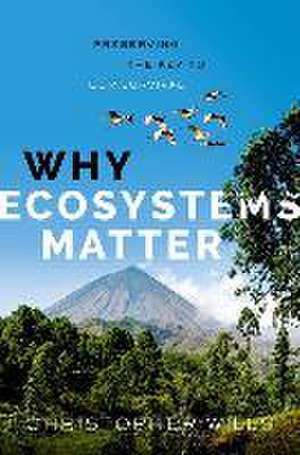Why Ecosystems Matter: Preserving the Key to Our Survival
Autor Christopher Willsen Limba Engleză Hardback – 11 iul 2024
Preț: 248.81 lei
Preț vechi: 274.52 lei
-9% Nou
Puncte Express: 373
Preț estimativ în valută:
47.61€ • 50.91$ • 39.70£
47.61€ • 50.91$ • 39.70£
Carte disponibilă
Livrare economică 17-22 martie
Livrare express 13-19 martie pentru 61.01 lei
Preluare comenzi: 021 569.72.76
Specificații
ISBN-13: 9780192887573
ISBN-10: 0192887572
Pagini: 224
Ilustrații: 19
Dimensiuni: 160 x 241 x 15 mm
Greutate: 0.52 kg
Editura: OUP OXFORD
Colecția OUP Oxford
Locul publicării:Oxford, United Kingdom
ISBN-10: 0192887572
Pagini: 224
Ilustrații: 19
Dimensiuni: 160 x 241 x 15 mm
Greutate: 0.52 kg
Editura: OUP OXFORD
Colecția OUP Oxford
Locul publicării:Oxford, United Kingdom
Recenzii
Books of the Year 2024, Geographical
Wills's pulsating book... draws on genetics to disentangle today's entangled banks - the inextricable links between all living beings - and to expand on Darwin's understanding of evolution.
Wills...has a clear, jargon-free writing style that helps to make Why Ecosystems Matter accessible for the lay reader... Over his career, Wills has worked across six continents and he uses short but vivid first-hand accounts of his experiences to bring the science in this book to life...
[a] wide-ranging book.
Wills's pulsating book... draws on genetics to disentangle today's entangled banks - the inextricable links between all living beings - and to expand on Darwin's understanding of evolution.
Wills...has a clear, jargon-free writing style that helps to make Why Ecosystems Matter accessible for the lay reader... Over his career, Wills has worked across six continents and he uses short but vivid first-hand accounts of his experiences to bring the science in this book to life...
[a] wide-ranging book.
Notă biografică
Christoper Wills is Professor Emeritus at the University of California San Diego. Wills was the first to generate an enzyme with changed function through artificial selection, and to show the nature of the genetic change and the nature of the functional change. More recently, his research includes widespread negative density-dependent selection and how it maintains the diversity of tree species in tropical forests. His books include The Wisdom of the Genes (1990), The Darwinian Tourist (2010), and Green Equilibrium (2013).
